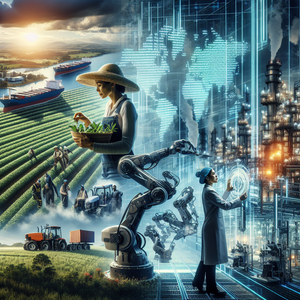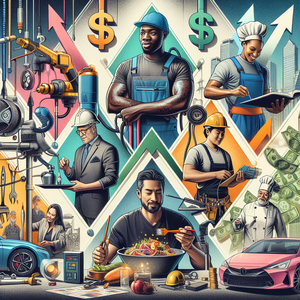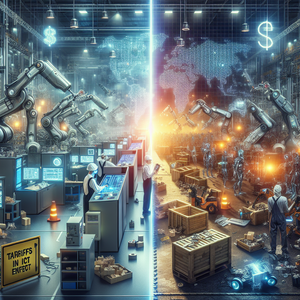
Adapting Careers to Trade War Challenges: Top 20 Roles Transformed by Tariffs in Agriculture, Trade, and Manufacturing
Global trade has undergone seismic shifts in recent years, driven by evolving trade policies and the imposition of tariffs. These changes, initiated during the Trump administration and extended under subsequent administrations, have dramatically reshaped industries like agriculture, manufacturing, and international trade. Tariffs, which were intended to protect domestic industries, have had far-reaching consequences—raising the costs of essential materials, disrupting supply chains, and shrinking export markets. For professionals navigating these turbulent waters, adaptation has become more than a necessity; it has become a defining feature of survival and growth in the modern economy.
Job Summaries:
Agricultural Economist:
- Tariffs have significantly altered the profitability of farming, raising costs for equipment, raw materials, and international exports.
- Agricultural economists help farmers adapt by diversifying markets, targeting new buyers, and recommending strategies like crop rotation.
- A degree in agricultural economics or related fields is essential, focusing on market analysis and strategic planning.
Tariff Compliance Specialist:
- Tariff compliance specialists ensure companies comply with trade laws while minimizing financial penalties.
- They assist in sourcing alternative materials and managing import/export documentation.
- A background in international trade or law and certifications like Certified Customs Specialist (CCS) are crucial.
Supply Chain Manager:
- Supply chain managers address disruptions caused by tariffs by rethinking sourcing, logistics, and inventory strategies.
- They negotiate with suppliers, identify alternative routes, and optimize operations.
- Degrees in supply chain management or logistics, combined with problem-solving skills, are key.
Agricultural Policy Analyst:
- Policy analysts examine how trade policies and tariffs impact agriculture, advocating for reforms and creating relief packages for affected farmers.
- They develop subsidy proposals and international agreements to shield farming communities.
- A background in public policy, economics, or agriculture is essential.
Farm Equipment Sales Representative:
- With tariffs driving up machinery costs, sales representatives innovate by offering financing options, trade-in programs, and refurbished equipment.
- Strong interpersonal skills and knowledge of agricultural machinery are critical for success.
International Trade Consultant:
- Trade consultants guide businesses in navigating tariff challenges by identifying untapped markets and optimizing supply chains.
- A degree in international business or economics, along with multilingual abilities, is highly advantageous.
Agricultural Equipment Engineer:
- Engineers design cost-effective, sustainable farming equipment to counter tariff-driven material price hikes.
- Expertise in mechanical or agricultural engineering and proficiency in design software are necessary.
Market Research Analyst (Agriculture):
- Analysts study how tariffs influence demand, pricing, and trade flows.
- Identifying alternative buyers for affected exports.
- A degree in marketing, economics, or business is essential.
- Strong analytical skills are required.
Trade Relations Officer:
- Trade relations officers negotiate agreements and foster international cooperation to address tariff-induced tensions.
- A background in international relations, law, or political science is vital for this diplomatic role.
Manufacturing Cost Analyst:
- Cost analysts identify savings opportunities amidst tariff-driven production cost hikes.
- A degree in finance, accounting, or industrial engineering is typically required.
Ag-Tech Specialist:
- Ag-tech specialists implement technology like IoT devices and drones to optimize productivity and reduce costs for farmers.
- A background in agricultural science or technology is necessary.
Export Sales Manager:
- Export sales managers maintain global market access by negotiating trade deals for affected industries.
- Strong sales experience and expertise in international trade are essential.
Logistics Coordinator:
- Logistics coordinators ensure smooth transportation of goods amidst supply chain disruptions caused by tariffs.
- A background in logistics or supply chain management and strong organizational skills are crucial.
Agricultural Export Policy Advisor:
- Advisors push for regulatory changes to promote agricultural exports, such as expanding tariff-free trade zones.
- A degree in public policy, economics, or law is fundamental.
Industrial Procurement Manager:
- Procurement managers source materials from new suppliers to address tariff-driven cost hikes.
- Expertise in contract negotiation and supplier relationships is critical.
International Relations Specialist (Trade):
- Specialists analyze geopolitical trends and propose solutions to tariff-related tensions.
- Facilitating discussions between trading partners.
- A degree in international relations or political science is essential.
Agricultural Journalist:
- Journalists document the impacts of tariffs on farming communities, influencing policy discussions.
- Strong writing skills and a background in agriculture and journalism are vital.
Farming Operations Manager:
- Operations managers guide farms through tariff challenges by adjusting crop strategies and managing budgets.
- A background in agriculture or business management is critical.
Customs Broker:
- Customs brokers streamline cross-border trade by managing documentation and ensuring compliance.
- Certification as a customs broker is required.
Data Scientist (Trade Analytics):
- Data scientists use analytics to predict tariff impacts and optimize business strategies.
- A background in data science, statistics, or economics is key.
As tariffs continue to reshape global trade, professionals in agriculture, manufacturing, and trade must adapt to the shifting landscape. These 20 roles illustrate how the workforce is evolving to meet new challenges and leverage opportunities. Whether you’re navigating supply chain disruptions, mitigating financial risks, or driving innovation in your field, embracing change is the key to resilience in a tariff-driven economy.
Explore More Jobs

